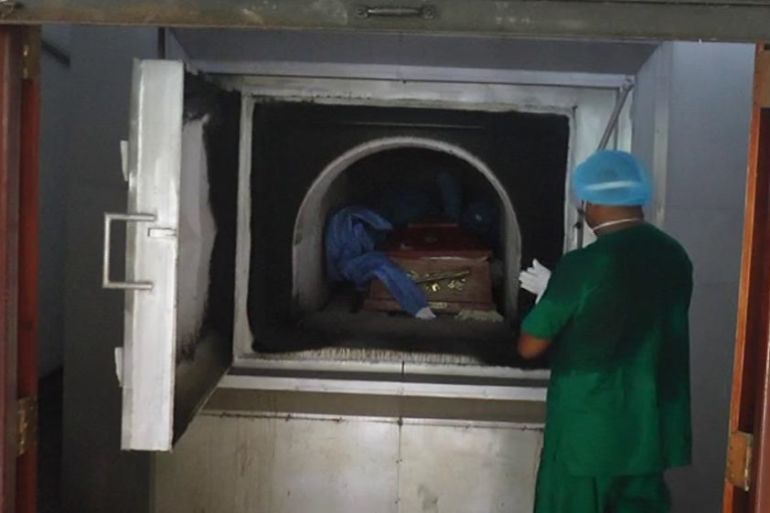Sri Lanka to cremate Muslim COVID-19 victims despite objections
Families have refused to claim the bodies in protest over the government’s policy of cremation, which is forbidden under Islamic law.

Sri Lanka said it would cremate the bodies of 19 Muslim coronavirus victims, overriding the families’ objections against the compulsory policy.
The island nation has been experiencing a surge in COVID-19 cases since October, with the number of infections increasing more than eightfold since then to more than 29,300 and 142 dead.
Keep reading
list of 4 itemsWhy Sri Lanka jailed a Muslim lawyer without charge for 6 months
Sri Lanka shuts parliament after coronavirus case detected
COVID-19 surge triggers prison riot in Sri Lanka, eight dead
Coronavirus victims’ bodies are claimed by families and then cremated – a practice forbidden under Islamic law – under the strict supervision of health authorities.
But families of 19 Muslims killed by the virus have refused to claim the bodies from a morgue in the capital Colombo, triggering an edict to proceed with cremation that was issued by Attorney General Dappula de Livera.
“Bodies of COVID-19 victims not claimed by families can be cremated in terms of quarantine regulations,” De Livera’s spokeswoman said on Wednesday, adding that the bodies would be cremated this week.
Five were cremated on Wednesday, police said.
The policy has been challenged by Muslims, with 12 petitions filed by the minority community and civil society groups in the Supreme Court.
But the top court rejected the petitions last week, without giving reasons why it made that decision.
Rehab Mahamoor, a research assistant at Amnesty international, told Al Jazeera from Colombo that the cremation of Muslims against their religious beliefs was “unjust”.
“International guidelines clearly state bodies of COVID-19 victims can be buried or cremated and Sri Lanka stands to use the pandemic to further marginalise the Muslim community,” Mahamoor added.
The Sri Lanka Muslim Council has said a majority of the country’s coronavirus victims were Muslim.
A council spokesman added that members of the community feared seeking medical help if they tested positive for COVID-19, as they did not want to be cremated.
“It’s very unfortunate the attorney general has taken this arbitrary decision … in most cases the immediate family is under quarantine and don’t have the opportunity of even identifying these bodies,” Hilmy Ahamed, vice president of the council told Al Jazeera from Colombo.
“No postmortems are done and it could cause legal complications,” he added.
The Organisation of Islamic Cooperation last month urged Sri Lanka to permit Muslims to bury their family members “in line with their religious beliefs and obligations”.
Ongoing religious tensions
Sri Lanka made COVID-19 cremations compulsory in April amid fears spread by influential Buddhist monks – who support President Gotabaya Rajapaksa – that burying bodies could contaminate groundwater and spread the disease.
The World Health Organization states both burials and cremations are permitted.
The method of the disposal of the body has become a major talking point in the country, with a section of the media accused of running “anti-Muslim hysteria” and pointing fingers at Muslims for the spread of the virus.
Following the deadly attacks in April 2019 that killed more than 250 people in churches and at hotels across Sri Lanka, Muslims have faced increased hostility from the Sinhala majority.
A little-known Muslim organisation was blamed for the island nation’s worst attack since the civil war fought between the government forces and the Tamil separatist fighters.
Sri Lanka has a population of about 21 million, of which some 10 percent are Muslims.